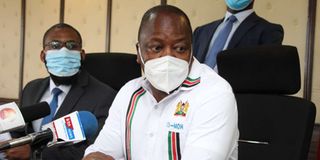Kagwe: Why Kenya has not suspended flights from Britain

Health Cabinet Secretary Mutahi Kagwe giving updates on the status of Covid-19 in the country at Afya House on December 24, 2020.
What you need to know:
- Mr Kagwe earlier said there was no need for Kenya to close its airspace due to the new variant of Covid-19.
- The CS said Kenya will make decisions based on scientific advice as well as any additional advice from WHO.
Travellers from Britain should have negative Covid-19 test results within a 96-hour period from the time they tested to the time they will be arriving in the country, according to the new guidelines by the Ministry of Health.
Responding to the Nation question on why the government has not suspended flights from Britain yet other countries have, Health Cabinet Secretary Mutahi Kagwe said Kenya has put in strict measures which were never in place in the said countries.
“We have very strict travel measures with the UK, which the US and Europeans did not have. We are carefully observing every passenger traveling from there. The UK has also put travel restrictions on its own citizens leaving the country,” Mr Kagwe said.
Mr Kagwe earlier said there was no need for Kenya to close its airspace due to the new variant since Britain is doing serious screening, and that Kenyans are not in danger as a country.
But as Kenya boasts of strict measures, high income countries with strict restrictions including 53 nations across five continents had by December 22 suspended flights from the UK over the discovery of the mutant coronavirus strain.
Mostly, the cases were imported by travellers from the UK and South Africa, a neighbouring country.
Mr Kagwe told the Nation that Kenya will make decisions based on scientific advice as well as any additional advice from the World Health Organization (WHO).
“These situations are always dynamic and can change, so we need to get advice from all the sectors before we act. Meanwhile the measures are in place to ensure safety of everyone,” he said.
The WHO has since warned that the new variant is spreading more rapidly than the original version and a more severe pandemic could come in the future.
The new variant
The new variant known as B.1.1.7 should make you more cautious than before, experts have warned. It was first discovered in the UK a few weeks after the country had its first citizen take the Pfizer Covid-19 vaccine, putting a worrisome face to the hope that the jab had brought.
Failure by the government to ban the flights could have risen from the fear of losing revenue.
Britain is one of Kenya’s main trading partners and last year , it accounted for the fourth largest arrivals through JKIA with 181,400 visitors.
Dozens of nations outside Europe have also blocked flights from Britain. They include Canada, Russia, India, Saudi Arabia and Argentina.
But some countries such as France, Netherlands, Belgium, Spain, Italy, German, Ireland and China have in recent days relaxed these travel restrictions from the UK.
The discovery of the new strain sowed a fresh wave of panic in a pandemic that has killed about 1.7 million people worldwide and more than 67,000 in Britain.
Closer home, South Africa has also reported a variant case of the Covid-19, highlighting the danger that the new strain poses to the continent. In Kenya, about 96, 251 have tested positive with the virus, which has killed 1,667 patients.
This is even as health experts warned of dire consequences should Kenya fail to act in time.
Professor Omu Anzala, a virologist at the University of Nairobi, warned that the new variant is distressing even though it is normal for viruses to mutate and that new variants are bound to come up.
“Everybody is worried because this new variant is spreading faster. When viruses change, we all become worried because they can change for the better or for the worse and this should disturb us as a country.”





